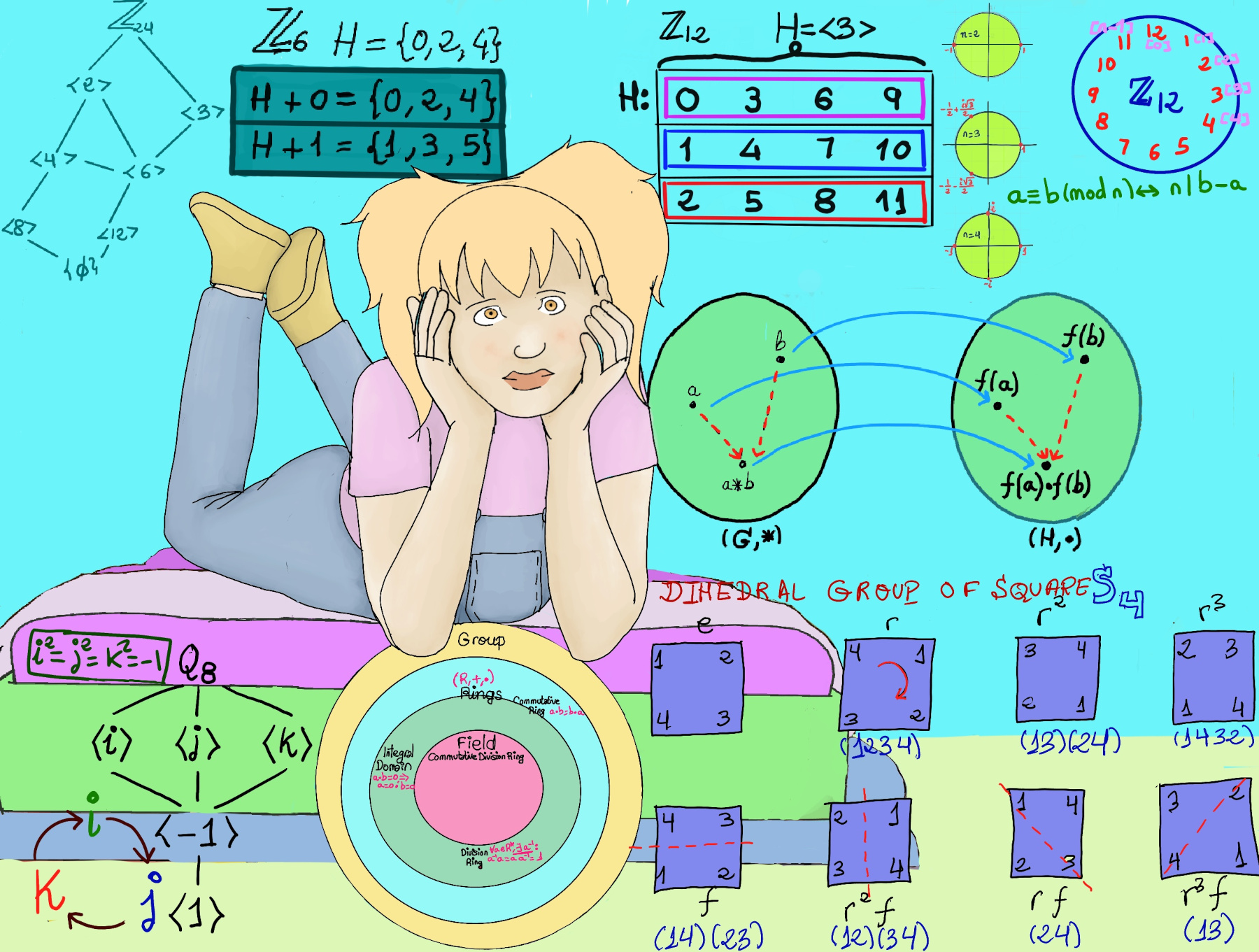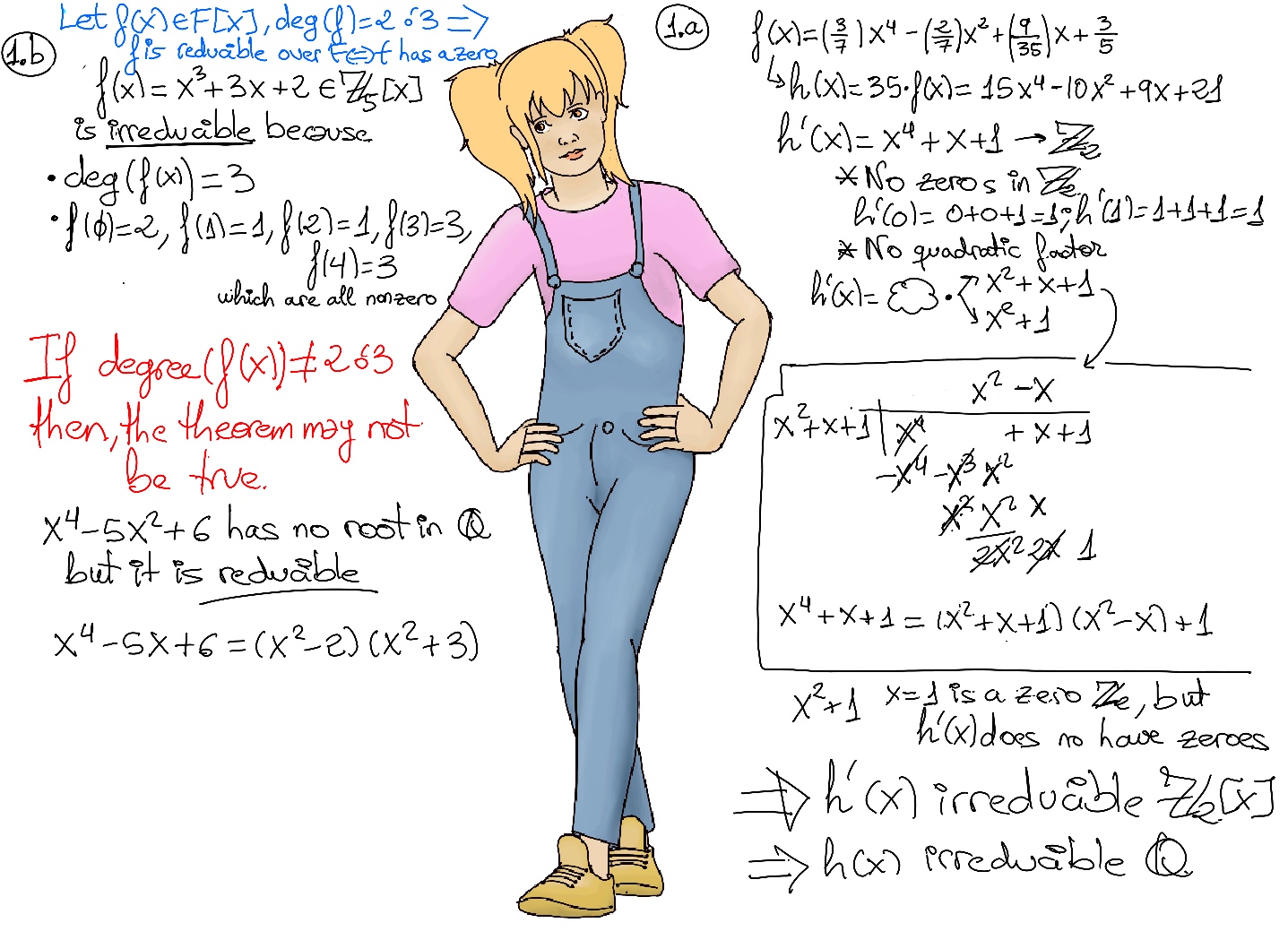
|
 |
 |

|
 |
 |
Doctors are semi-gods beings, completely infallible, only do good, and money does not corrupt medicine, so turn off this monkey brain of yours and outsource all of your thinking to them -you are welcome! Apocalypse, Anawim, #justtothepoint.
Definition. Let D be an integral domain. An irreducible polynomial is, roughly speaking, a polynomial that cannot be factored into the product of two non-constant polynomials. A non-zero and non-unit polynomial f(x) ∈ D[x] is said to be irreducible if it cannot be written or expressed as the product of two non-units. In other words, whenever f(x) is expressed as a product of two polynomials g(x)h(x) with g(x) and h(x) ∈ D[x], then either g(x) or h(x) is a unit in D[x].
A non-constant polynomial f(x) ∈ F[x], F field, is said to be irreducible if f(x) cannot be expressed a as a product of two polynomials g(x), h(x) ∈ F[x] of lower degree, that is, f(x) = g(x)h(x), deg(g(x)) < deg(f(x)) and deg(h(x)) < deg(f(x)).
Reducibility test for polynomials with degrees two or three. Let F be a field. If f(x) ∈ F[x] and deg(f(x)) = 2 or 3, then f(x) is reducible over F iff f has a zero in F or f(x) is irreducible over F iff f(α) ≠ 0 ∀α ∈ F.

Theorem. Let f(x) ∈ ℤ[x]. If f(x) is reducible over ℚ, then it is reducible over ℤ.
Proof.
Suppose f is reducible over ℚ ⇒ ∃g(x), h(x) ∈ ℚ[x] such that f(x) = g(x)h(x) with both polynomials g(x) and h(x) having degree less than of f(x). We could assume that f is primitive because we can divide both f and g by the content of f.
Next, let a and b be the least common multiple of the denominators of the coefficients of g and h respectively, so abf(x) = ag(x)·bh(x), where ag(x) ∈ ℤ[x] and bh ∈ ℤ[x].
Now, let c and d be the content of ag(x) and bh(x) respectively ⇒ ag(x) = cg’(x) and bh(x) = dh’(x) where both g’(x) and h’(x) are primitives ⇒ abf(x) = (ag(x))·(bh(x)) = (cg’(x))(dh’(x)) = cdg’(x)h’(x), where both g’(x) and h’(x) are primitives polynomials in ℤ[x], so their product is primitive, and f is primitive, too ⇒ content(abf(x)) =[f is primitive] ab = content(cdg’(x)h’(x)) =[g’(h)h’(x) is primitive] cd ⇒[ab = cd & abf(x) = cdg’(x)h’(x) & Cancellation law applies] f(x) = g’(x)h’(x) where both g’(x) and h’(x) are primitives polynomials in ℤ[x] and deg(g’(x)) = deg(g(x)) and deg(h’(x)) = deg(h(x)) and both polynomials g’ and h’ having degrees less than of f, therefore f is reducible over ℤ ∎
Mod p Irreducibility Test. Let p be a prime, f(x) ∈ ℤ[x], and deg(f(x)) ≥ 1. Let f'(x) be the polynomial in ℤp[x] obtained from f(x) by reducing all the coefficients of f(x) modulo p. If f'(x) is irreducible over ℤp and deg(f'(x)) = deg(f(x)), then f(x) is irreducible over ℚ.
Proof.
Suppose f’(x) is irreducible over ℤp and deg(f’(x)) = deg(f(x)). For the sake of contradiction, let us assume f is reducible over ℚ ⇒[Theorem. Let f(x) ∈ ℤ[x], then f(x) is irreducible over ℚ, then it is reducible over ℤ.] f is reducible over ℤ, that is, ∃g(x), h(x) ∈ ℤ[x], f(x) = g(x)h(x) with both polynomials g(x) and h(x) having degree less than of f(x) ⇒[f is reducible] 1 ≤ deg(g)< deg(f) and 1 ≤ deg(h) < deg(f). Then, the idea is that the same relationship holds taking all coefficients modulo p.
Let f’, g’, and h’ be the polynomials obtained from f, g, and h by reducing all the coefficients modulo p.
Since deg(f) = deg(f’) ⇒ deg(g’) ≤ deg(g) < deg(f’) and deg(h’) ≤ deg(h) < deg(f’) and f’ = g’h’ ⇒ f’ = g’h’, deg(g’) < deg(f’) and deg(h’) < deg(f’) ⊥ Therefore, this contradicts our assumption that f’(x) is irreducible over ℤp, so f is irreducible over ℚ.
In fact, deg(g’) = deg(g) and deg(h’) = deg(h). Otherwise, deg(f’) = deg(g’h’) = deg(g’) + deg(h’) < deg(g) + deg(h) = deg(gh) = deg(f) ⊥ By assumption, deg(f) = deg(f’).
Examples.

Eisenstein Criterion. Let p ∈ ℤ be a prime. If f(x) = anxn + an-1xn-1 + ··· + a0 in ℤ[x] have degree ≥ 1 with
Then, f(x) is irreducible in ℚ[x].
Proof:
This proof is by contradiction. Let’s assume that f is not irreducible. If f(x) is reducible over ℚ ⇒[Theorem. Let f(x) ∈ ℤ[x], then f(x) is irreducible over ℚ, then it is reducible over ℤ.] f is reducible over ℤ, that is, ∃g(x), h(x) ∈ ℤ[x]: f(x) = g(x)h(x) and the degrees of g and h are less than n.
Say g(x) = brxr + ··· + b0, h(x) = csxs + ··· + c0.
Since p | a0, p2 ɫ a0, and a0 = b0c0 ⇒ p divides b0 or c0, but not both. Let’s suppose p | b0 and p ɫ c0 without any loss of generality.
Since p ɫ an = brcs ⇒ p ɫ br, but p | b0, hence there is a least integer t such that p ɫ bt (p | bt-1, ··· p | b1, p| b0). Next, let us consider at = btc0 + bt-1c1 + ··· + b0ct. Then, p | at (Notice that r = deg(g(x)) = deg(brxr + ··· + b0) < n ⇒ t ≤ r < n ), and p divides every summand on the right after the first term btc0, that is, (bt-1c1 + ··· + b0ct) ⇒ p | btc0, p prime ⊥ p ɫ bt, p ɫ c0
Eisenstein theorem applies after substitution x → x + a. If the polynomial after substitution (is is just an automorphism of the ring ℚ([x]), and automorphisms preserve algebraic properties) is irreducible then allows concluding that the original polynomial is irreducible as well.
Corollary. For any prime p, the pth cyclotomic polynomial Φp(x) = $\frac{x^p-1}{x-1}=x^{p-1}+x^{p-2}+···+x+1$ is irreducible over ℚ.
Proof. Let f(x) = Φp(x+1) = $\frac{(x+1)^p-1}{(x+1)-1}=x^{p-1}+(\begin{smallmatrix}p\\ 1\end{smallmatrix})x^{p-2}+(\begin{smallmatrix}p\\ 2\end{smallmatrix})x^{p-3}+···+(\begin{smallmatrix}p\\ p-2\end{smallmatrix})x+(\begin{smallmatrix}p\\ p-1\end{smallmatrix})1$
f(x) does satisfy the conditions of Eisenstein’s criterion because $(\begin{smallmatrix}p\\ k\end{smallmatrix})$ is divisible by p for 1 ≤ k ≤ p−1, p ɫ 1, and $(\begin{smallmatrix}p\\ p-1\end{smallmatrix})$ is not divisible by p2 ⇒ Φp(x+1) is irreducible.
But if Φp(x) = g(x)h(x) were a nontrivial factorization of Φp(x) over ℚ, then so would Φp(x+1) be no trivially factored, Φp(x+1) = g(x+1)h(x+1) ⊥
Examples: p = 2, $\frac{x^2-1}{x-1}=x+1$ is irreducible over ℚ. p = 3, $\frac{x^3-1}{x-1}=$ x2 + x + 1 is irreducible over ℚ.
Rational root test. Let f = anxn +an-1xn-1 + ··· + a0 ∈ ℤ[x], a0an ≠ 0. Each rational solution r/s written in lowest terms so that r and s are relatively prime, satisfies that r is a factor of the constant term a0 (r | a0) and s is a factor of the leading coefficient an (s | an).
Proof.
Let f = anxn +an-1xn-1 + ··· + a0 ∈ ℤ[x], let r/s be a rational solution.
anrn⁄sn + ··· + a1r⁄s + a0 = 0 ⇒ [Multiply by sn] anrn + an-1rn-1s + ··· + a1rsn-1 + a0sn = 0 ⇒ r(anrn-1 + ··· + a1sn-1) = -a0sn ⇒ r | a0sn ⇒ [r and s are coprime] r | a0.
Similarly, anrn + an-1rn-1s + ··· + a1rsn-1 + a0sn = 0 ⇒ s(an-1rn-1 + ··· + a1rsn-2 +a0sn-1) = -anrn ⇒ s | anrn ⇒ [r and s are coprime] s | an∎
bd = 1 ⇒ b = d = 1 or b = d = -1.
If b = d = 1 ⇒[ad + bc = -2] a + c = -2 ⊥ a + c = 0. Otherwise, b = d = -1 ⇒[ad + bc = -2] -a -c = -2 ⇒ a + c = 2 ⊥ a + c = 0.